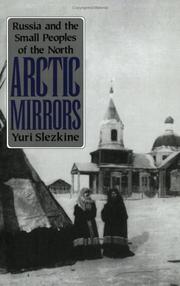Check nearby libraries
Buy this book

"And, sovereign, having captured a shaman in battle, we asked him: what kind of man are you and do you have kinsmen? And he said: I am the best man of the Shoromboiskii clan and I have four sons. And so we kept him as hostage.".
For over five hundred years the Russians have been wondering what kind of people their Arctic and sub-Arctic hostages were. "They have mouths between their shoulders and eyes in their chests," reported a fifteenth-century tale. "They rove around, live of their own free will, and beat the Russian people," complained a seventeenth-century Cossack. "Their actions are exceedingly rude. They do not take off their hats and do not bow to each other," huffed an eighteenth-century scholar.
They are "children of nature" and "guardians of ecological balance," rhapsodized early nineteenth-century and late twentieth-century romantics. Even the bolsheviks, who categorized the circumpolar foragers as authentic proletarians," were repeatedly puzzled by the "peoples ... from the late Neolithic period who, by virtue of their extreme backwardness, cannot keep up either economically or culturally with the furious speed of the emerging socialist society."
- Whether described as brutes, aliens, or endangered indigenous populations, the so-called small peoples of the north have consistently remained a point of contrast for speculations on Russian identity and a convenient testing ground for policies and images that grew out of these speculations. In a vividly rendered history of circumpolar peoples in the Russian empire - and in the Russian mind - Yuri Slezkine offers the first in-depth interpretation of this relationship.
No other book in any language links the history of a colonized non-Russian people to the full sweep of Russian intellectual and cultural history. Enhancing his account with vintage prints and photographs, Slezkine reenacts the procession of Russian fur traders, missionaries, tsarist bureaucrats, radical intellectuals, professional ethnographers, and commissars who struggled to reform and conceptualize this most "alien" of their subject populations.
He reconstructs from a vast range of sources the successive official policies and prevailing attitudes toward the northern peoples, interweaving the resonant narratives of Russian and indigenous contemporaries with the extravagant images of popular Russian fiction.
As he examines the many ironies and ambivalences involved in successive Russian attempts to overcome northern - and hence their own - otherness - Slezkine explores the wider issues of ethnic identity, cultural change, nationalist rhetoric, and not-so-European colonialism.
Check nearby libraries
Buy this book

Previews available in: English
Subjects
Politics and government, Ethnic relations, Arctic peoples, Indigenous peoples, History, Russia (federation), politics and government, Russia (federation), social conditions, Soviet union, history, 20th century, Soviet union, ethnic relations, Soviet union, politics and governmentPlaces
Northern RussiaTimes
20th century| Edition | Availability |
|---|---|
|
1
Arkticheskie zerkala: Rossii︠a︡ i malye narody Severa
2008, Novoe literaturnoe obozrenie, Novoe Literaturnoe Obozrenie
in Russian
5867935612 9785867935610
|
zzzz
|
|
2
Arctic Mirrors: Russia and the Small Peoples of the North
October 1996, Cornell University Press
Paperback
in English
- New Ed edition
0801481783 9780801481789
|
zzzz
|
|
3
Arctic mirrors: Russia and the small peoples of the North
1994, Cornell University Press
in English
0801429765 9780801429767
|
aaaa
|
Book Details
Edition Notes
Includes bibliographical references (p. 397-445) and index.
Classifications
The Physical Object
Edition Identifiers
Work Identifiers
Community Reviews (0)
| July 25, 2024 | Edited by MARC Bot | import existing book |
| August 18, 2020 | Edited by ImportBot | import existing book |
| July 31, 2020 | Edited by Mek | import existing book |
| February 28, 2020 | Edited by MARC Bot | remove fake subjects |
| December 10, 2009 | Created by WorkBot | add works page |











